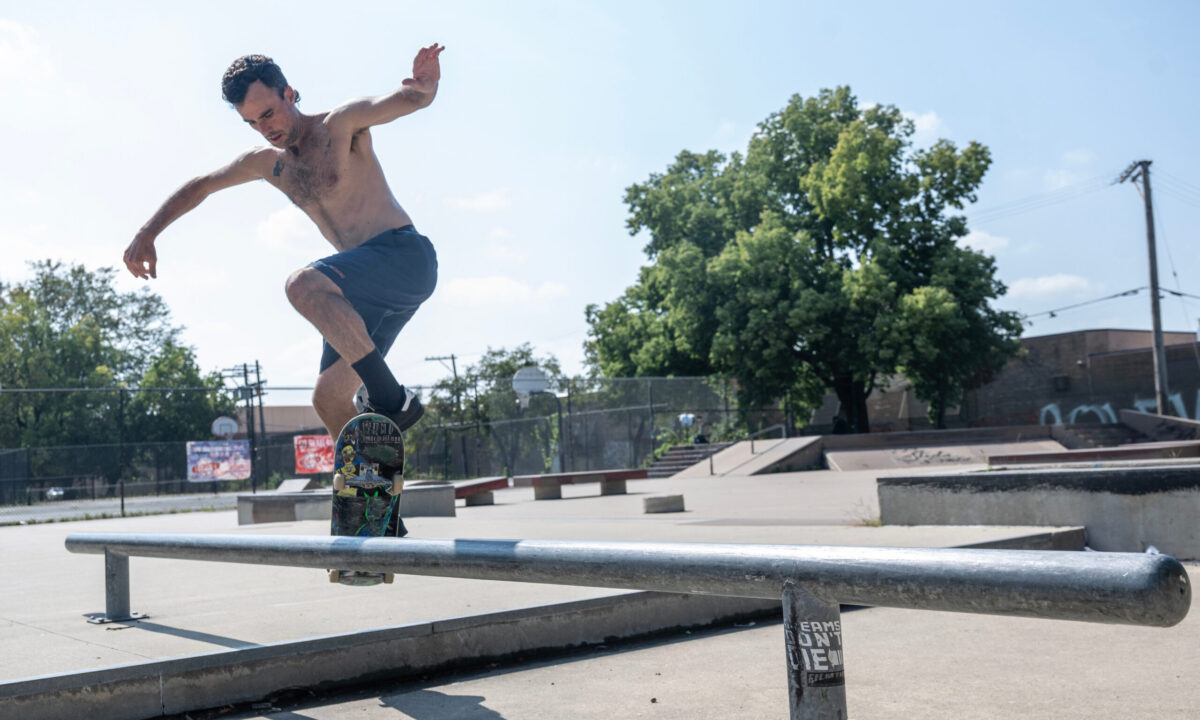There’s a color line to the politics of parks in Chicago. Last year, an analysis in Borderless magazine found residents of Latino neighborhoods have 41% less access to parks than the average Chicagoan.
Such inequities are part of the longstanding environmental racism plaguing Little Village that necessitated the Little Village Environmental Justice Organization (LVEJO). LVEJO led a 15-year fight to clean up the toxic Celotex superfund site and turn it into La Villita Park in 2014.
But before La Villita, Piotrowski and North Lawndale’s Douglass were the only parks around.
Recent protests against Riot Fest’s annual appropriation of Douglass Park, which makes it inaccessible to residents during our fleeting summer, illustrate access to green space and parks is an ongoing struggle.
That lack of green space in Little Village motivated graffiti artist Gloria “Gloe” Talamontes’ “Brown Wall Project.” In working-class communities like La Villita, the city doesn’t remove graffiti by powerwashing walls back to their original appearance. Instead, they slather fecal-colored paint across them, creating brown walls that literally look like sh*t.
So Gloe began painting lush floral murals on them, composting these sites of racialized disregard into the virtual green space lacking in our communities.
Rather than artists creating a simulacra, I’d argue the hundreds of millions of dollars Chicago gives to already-wealthy corporations to revitalize vacant office space downtown could create green space and resource parks in our neighborhoods. (In fact, turn empty offices into vertical farms to sustainably feed communities, like people are doing with dead malls.)
Parks matter and green space should be a public good, not a luxury one.
My dad remembers when Piotrowski was “Lawndale Park.” It’s where he and my mom could go with a Chickie’s beef when they started dating in high school. Piotrowski’s where my mom, a marathon runner, first tried running and couldn’t do a lap around the park. Growing up, my dad played baseball there. After games, we’d go across the street to Home Run Inn pizza.
The first time I saw my husband perform was at Piotrowski in a play for Chicago Shakes offered by Chicago’s “Night Out in the Parks” initiative. After, we went to Home Run Inn, my husband’s favorite pizza (that he thought was only a frozen pizza company until we started dating.)
Piotrowski isn’t just a place in my husband’s theatrical career. It’s the main setting for my first play and its film adaptation, The Real Life Adventures of Jimmy de las Rosas.
Real Life Adventures is about a queer telekinetic Mexican American boy who lives with his undocumented mother and grandmother who’s an elotera at Piotrowski. Inspired by 2006 immigration raids, it takes place during a summer when neighborhood residents are disappearing.
When his mother disappears, Jimmy must find her and discovers tech billionaires are behind the abductions and forcing the desaparecidos to build an island city in Lake Michigan. These billionaire villains’ plan is to survive the climate collapse that men like them created by occupying this island in the Great Lakes—the largest source of freshwater after the melting polar ice caps in a world already riddled with water scarcity.
It’s supposed to be science fiction, but with current ICE abductions and ultra-rich “preppers” investing in such refuges to insulate themselves from climate crisis, I guess it’s a documentary.
An early version of the play Real Life Adventures of Jimmy de las Rosas was produced by one of my artistic homes, Free Street Theater, with “Night Out in the Parks.” On Friday, July 31, 2015, it was performed at Piotrowski.
I remember watching a play I wrote with my family in this park that’s a part of our history. At one point, I saw a small Brown boy wearing a cape from home, punching his arms into the air, acting along with the action happening onstage. I had to fight from crying. That moment remains the most fulfilling of my artistic career. Piotrowski gave me that.
Go there. Get a mango from the cart on the northeast corner. Watch Brown supermen hit home runs or kids fly in the skate park. Listen to the soundtrack of children on the playground, families in the pool, and bells of passing paleta carts. If heaven doesn’t look like this, I don’t want it.

